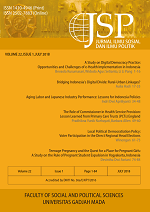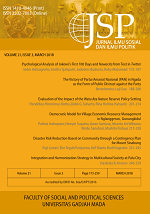Post-conflict Reconciliation in Aceh, Indonesia: Perspectives from the Victims
Abdul Manan(1*), Abdul Hadi(2), Iping Rahmat Saputra(3)
(1) Universitas Islam Negeri Ar-Raniry, Banda Aceh, Indonesia
(2) Sekolah Tinggi Agama Islam Tgk Chik Pante Kulu, Banda Aceh, Indonesia
(3) Universitas Islam Negeri Ar-Raniry, Banda Aceh, Indonesia
(*) Corresponding Author
Abstract
This field research using participant observation critically analyzed the post-war reconciliation between Aceh Province and the Indonesian Government. Special attention was paid to the violent incidents at Rumoh Geudong, Krueng Arakundoe, and Jambo Keupok. Besides, in-depth interviews with 16 informants who were engaged directly and indirectly on the problems to collect the data, followed by employing library research to sight the findings. The peace agreement was concluded by parties who hated each other. Contrarily, the government’s function as the developer of the post-understanding process was not shown substantially. This has further enhanced the new forms of violence carried out after the previous violence. This meant nothing to the power of peace itself. The reconciliation was not substantially successful but failed. The absence of which had an impact on the existence of war victims, particularly in rebuilding their psychological conditions. Human values during the 14 years of peace were not programmed in priority at all, which generated extensive sustainable peace. The collapse of the state’s responsibility to unravel all cases of dehumanization had an impact on the increasingly dominating pragmatic value, meaning that the value of the existence of war victims was minimal, even closer to nothing.
Keywords
Full Text:
PDFReferences
Andersson, T., & Mukherjee, C. (2021). Seeking no war, achieving No peace: the conflict over the Siachen Glacier. Defence and Peace Economics, 32(3), 253–270. https://doi.org/10.1080/10242694.2019.1660839
Biro Humas dan Protokol Pemerintah Aceh. (2020). Aceh peringkat 7 nasional penurunan angka kemiskinan. http://humas.acehprov. go.id/aceh-peringkat-7-nasional- penurunan-angka-kemiskinan/
Bloomfield, D. (2006). On good terms: clarifying reconciliation. http://edoc.vifapol.de/opus/ volltexte/2011/2521/pdf/br14e.pdf
Brounéus, K. (2007). Dialogue on globalization: reconciliation and development. Friedrich Ebert Stiftung.
Charmaz, K., & Thornberg, R. (2021). The pursuit of quality in grounded theory. Qualitative Research in Psychology, 18(3), 305–327. https://doi.org/10.1080/14780887.2020.1780357
Connolly, L. (2012). Justice and peace building in post-conflict situations. ACCORD Occasional Paper, 6(1), 1–38.
Chaidar, Al. (1999). Gerakan Aceh Merdeka: Jihad Rakyat Aceh Mewujudkan Negara Islam. Cibinong. Madani Press.
Dani, S. (2018). Ini total dana otsus yang telah diterimaAceh sejak tahun 2008. Serambinews. https://aceh.tribunnews.com/2018/07/08/ ini-total-dana-otsus-yang-telah-diterima- aceh-sejak-tahun-2008
Darmanto, H. A. (2014). Pemberontakan Daud Beureueh (DI/TII Aceh) tahun 1953-1962. Jember.
Diprose, R. (2009). Decentralization, horizontal inequalities and conflict management in Indonesia. Ethnopolitics, 8(1), 107–134. https://doi.org/10.1080/17449050902738804
Djumala, D. (2013). Soft power untuk Aceh.Gramedia Pustaka Utama.
Doxtader, E. (2003). Reconciliation—a rhetorical concept/ion. Quarterly Journal of Speech, 89(4), 267–292. https://doi. org/10.1080/0033563032000160954
Fraser, N., & Honneth, A. (2003). Redistribution or recognition?: a political-philosophical exchange (J. Golb, J. Ingram, & C. Wilke (trans.)). Verso.
Gittner, L. (2016). Law enforcement disconnect from the community. Cogent Social Sciences, 2(1), 1–9. https://doi.org/10.1080/23311886.2016.1191322
Harpviken, K. B., & Røislien, H. E. (2005). Mapping the terrain: the role of religion in peacemaking.
Herdiansyah, H. (2010). Metodologi penelitian kualitatif untuk ilmu-ilmu sosial. Salemba Humanika.
Hill, H., & Vidyattama, Y. (2016). Regional development dynamics in Indonesia before and after the ‘big bang’ decentralization. The Singapore Economic Review, 61(2), 1–26. https://doi.org/10.1142/ S0217590816400270
Hitman, G. (2020). From separatism to violence: a typology of interactions between the citizen and the state establishment. Cogent Social Sciences, 6(1), 1–13. https://doi.org/10.1080/23311886.2020.1832345
Husein, A. (2017). Catatan kekerasan HAM pada zaman Megawati berkuasa. Tirto. https:// tirto.id/catatan-kekerasan-ham-pada- zaman-megawati-berkuasa-cwbD
Hydén, G. (2000). Post-war reconciliation and democratization: concepts, goals and lessons learnt. In After War: Reconciliation and Democratization in Divided Societies - Lessons learned. https://open.cmi.no/cmi- xmlui/bitstream/handle/11250/2436145/ WP 200 0. 8 Go ran- 07 202 007 _2 . pdf?sequence=2
Ishak, O. S. (2001). Peristiwa Idi Cut Aceh : dari tragedi ke impunitas (1st ed.). Cordova.
Komnas Perempuan. (2009). Kondisi tahanan perempuan di Nanggroe Aceh Darussalam. Komisi Nasional Anti Kekerasan Terhadap Perempuan.
KontraS. (2016). Peringatan 13 tahun peristiwa Jambo Keupok – Merawat ingatan, menuntut keadilan. KontraS. http:// kontras.org/backup/home/index. php?module=pers&id=2276
Kusumaningrum, D. (2017). Interdependence versus truth and justice: lessons from reconciliation processes in Maluku. Jurnal Ilmu Sosial Dan Ilmu Politik, 20(1), 34. https://doi.org/10.22146/jsp.17998
Lewin, E. (2016). The inevitable dead end of the Arab-Israeli conflict. Cogent Social Sciences, 2(1), 127–137. https://doi.org/10.1080/23311886.2016.1227294
Maharani, E. (2020). 15 tahun perdamaian Aceh, bendera bulan bintang dikibarkan. Republika. https://www.republika.co.id/ berita/qf3ktf335/15-tahun-perdamaian- aceh-bendera-bulan-bintang-dikibarkan
Manan, A., & Ismail, F. (2014). Syari’at Islam di Aceh: realitas dan respon masyarakat. Ar- Raniry Press.
Marthoenis, M., Yessi, S., Aichberger, M. C., & Schouler-Ocak, M. (2016). Mental health in Aceh – Indonesia: a decade after the devastating tsunami 2004. Asian Journal of Psychiatry, 19, 59–65. https://doi. org/10.1016/j.ajp.2016.01.002
Marzuki, N., & Warsidi, A. (2011). Fakta bicara: mengungkap pelanggaran HAM di Aceh 1989-2005. Koalisi NGO HAM Aceh.
Nana, S. S. (2007). Metode penelitian pendidikan. Remaja Rosdakarya.
Nussio, E., Rettberg, A., & Ugarriza, J. E. (2015). Victims, nonvictims and their opinions on transitional justice: findings from the Colombian case. International Journal of Transitional Justice, 9(2), 336–354. https:// doi.org/10.1093/ijtj/ijv006
Oettler, A., & Rettberg, A. (2019). Varieties of reconciliation in violent contexts: lessons from Colombia. Peacebuilding, 7(3), 329–352. https://doi.org/10.1080/21647259.2019.1617029
Omerovic, N. (2017). The role of religious leaders in the process of reconciliation in Bosnia and Herzegovina: the case of Bosnian imams. Ibn Haldun University Alliance of Civilizations Institute.
Putri, L. H., & Perm atasari, M . (2018). Implementasi pemenuhan hak atas reparasi bagi perempuan korban konflik Aceh ditinjau dari hukum internasional. Syiah Kuala Law Journal, 2(3), 419–438. https://doi.org/10.24815/sklj.v2i3.12400
Rahmani, A. F. (2021). Bibilografi Sejarah Pandemi Black Death di Mesir Pada Abad Ke 14 M. Khazanah Pendidikan Islam, 3(1), 1–9.
Razali, H. (2019). Menunggu dewi keadilan mampir ke Rumoh Geudong. Lokadata. https:// lokadata.id/artikel/menunggu-dewi- keadilan-mampir-ke-rumoh-geudong
Sahlan, M., Fajarni, S., Ikramatoun, S., Kamil, A. I., & Ilham, I. (2019). The roles of ulama in the process of post-conflict reconciliation in Aceh. Society, 7(2), 251–267. https://doi. org/10.33019/society.v7i2.106
Sewe, M. L. J. (2018). The contribution of religion to social reconciliation: a case study of Liberia. Journal of Global Peace and Conflict, 6(2), 1–8. https://doi.org/10.15640/ jgpc.v6n2a1
Siregar, S. N. (2016). Pergeseran masalah keamanan di Aceh. Jurnal Penelitian Politik, 9(2), 51–62. https://doi.org/https:// doi.org/10.14203/jpp.v9i2.230
Somasundaram, D. J., & Sivayokan, S. (1994).War trauma in a civilian population.British Journal of Psychiatry, 165(4), 524–527. https://doi.org/10.1192/bjp.165.4.524
Sooka, Y. (2006). Dealing with the past and transitional justice: building peace through accountability. International Review of the Red Cross, 88(862), 311–325. https://doi.org/10.1017/S1816383106000543
Sujatmiko, I. G. (2012). Conflict transformation and social reconciliation: the case of Aceh, Indonesia. Asian Social Science, 8(2), 104–111. https://doi.org/10.5539/ass.v8n2p104
Taylor, C. (1994). Multiculturalism: examining the politics of recognition. Princeton University Press.
Utama, A. (2015). Kisah negosiator Finlandia penghubung kepala BIN-Din Minimi. CNN Indonesia. https://www.cnnindonesia. com/nasional/20151231091159-20-101329/ kisah-negosiator-finlandia-penghubung- kepala-bin-din-minimi
Article Metrics
Refbacks
- There are currently no refbacks.
Copyright (c) 2022 Jurnal Ilmu Sosial dan Ilmu Politik

This work is licensed under a Creative Commons Attribution-NonCommercial-NoDerivatives 4.0 International License.






















